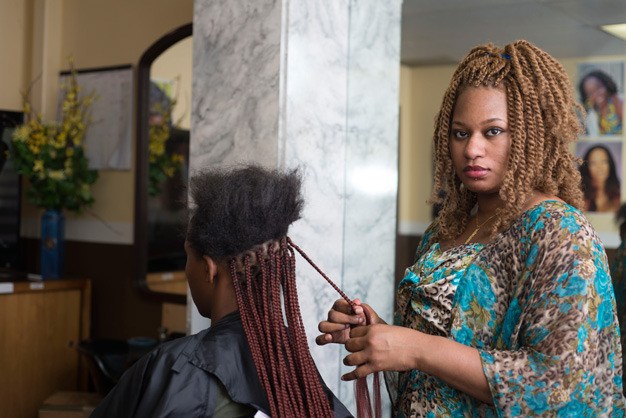It appears any conflict between a Kent woman who runs an African hair braiding salon and the state Department of Licensing could soon be coming to an end.
Salamata Sylla filed a lawsuit in U.S. District Court in June that she should be allowed to operate her business without a cosmetology license. State inspectors had told Sylla in 2013 that she needed such a license to keep her Kent shop open although state officials later claimed it was all a miscommunication. The Kent Reporter published a story about the dispute in May.
Lawyers for Sylla announced on Nov. 14 that the lawsuit had been put on hold after state officials agreed to adopt a new administrative rule to exempt hair braiders from the cosmetology license. Braiders would have to spend 1,600 hours in cosmetology school, where not one minute is spent learning hair braiding.
“We actually settled the case last week when we agreed to formally adopt a statement that hair braiding does not require a cosmetology license,” said
Christine Anthony, spokeswoman for the DOL, during a Monday phone interview. “We will formally adopt it as a rule.”
The rule-making process goes through the state Office of the Code Reviser. The state will hold a public hearing in the next month or so before adoption of the rule.
“The department is not changing its stance,” Anderson said. “We are just formalizing the rule. Hair braiders have always not needed a cosmetology license.”
Sylla, who is represented by the Institute for Justice, just desires the law to be clear.
“All I want is for the department to keep its word to me and Washington’s other braiders,” Sylla said in a media release issued by the Virginia-based Institute for Justice. “I’m proud that my case has convinced the department to try and fix its policies once and for all.”
Lawyers filed a similar suit against the state in 2004 on behalf of Seattle hair braider Benta Diaw.
The department’s 2004 agreement with Diaw resulted in a non-binding policy statement. The department’s new agreement with Sylla would make that policy statement a legally binding rule, according to the Institute for Justice media release. In addition, the state has issued an apology to Sylla. If the state’s rule-making efforts are successful, Sylla has agreed to dismiss her lawsuit. If not, the case can resume.
“Washington’s cosmetology officials deserve praise for trying to fix the state’s braiding laws,” said Wesley Hottot, an attorney with the Institute for Justice. “But this case is not over. If the department doesn’t follow through with a rule exempting hair braiders, we will be back in court. The government cannot license something as safe and common as hair braiding.”
Sylla opened her own shop on Kent’s East Hill in 2012 after working several years in Seattle. Her shop is in a small strip mall across from Kent-Meridian High School. It’s called Sally’s Africain Hair Braiding, using the French spelling of African in the name and her nickname of Sally.
For more information about the lawsuit, visit ij.org/washington-african-hair-braiding.
Talk to us
Please share your story tips by emailing editor@kentreporter.com.
To share your opinion for publication, submit a letter through our website https://www.kentreporter.com/submit-letter/. Include your name, address and daytime phone number. (We’ll only publish your name and hometown.) Please keep letters to 300 words or less.

